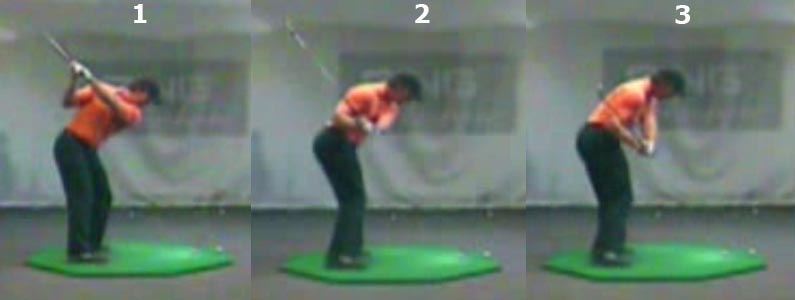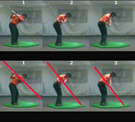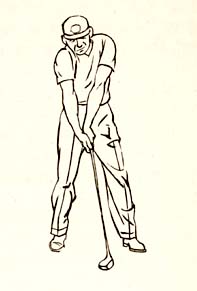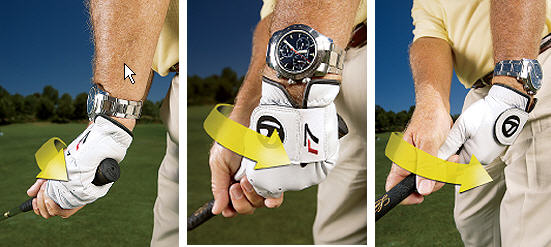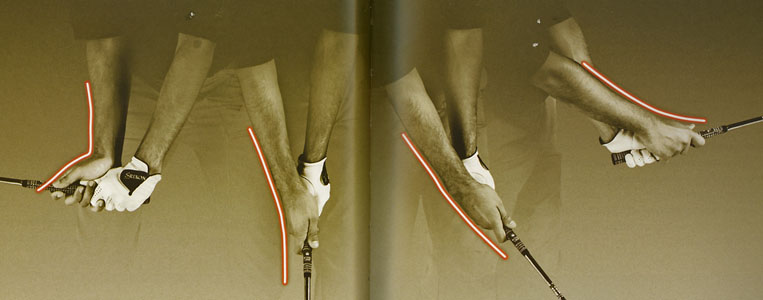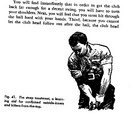Hmmm…..interesting Jeff, and thanks. You’re right of course, but I’m not 100% sure you’ve ‘got me’ as guru puts it! (bear with me – I have a technicality! – see below).
Lag – I think my use of ‘arch’ is maybe a little much. I mean from a cupped to a slightly concave position rather than a really arched one. Basically, from cupped to the ideal wrist position. Silly me! Thanks again for your remarks.
I’ll try to explain my thinking a little further.
Again I’m looking at Hogan’s hands and wil work closely from Five Lessons (which I didn’t have with me last time!!!! excuses…..).
The key question is this: what did Hogan mean by pronation and supination? We all know they are ‘palm up’ and ‘palm down’ words but it is key to ask: “what are his reference points for the word?”
Is it medical terminology? Where did Hogan pick the word up? What did he intend it to mean?
From a close reading of his writing, I think his reference points for the words are the sky and the ground. (and not, as is often assumed, the relationship of different body parts to eachother).
The evidence:
(This is from Hogan’s discussion of impact):
Five Lessons Page 100: ‘During this climactic point in the swing, the left wrist and back of the left hand begin to supinate very slightly – that is, to turn from a position where the palm is facing down to a position where the palm is up’.
Essentially, he’s talking about how, at the top of the backswing, his palm faces the ground, but at impact, it slightly faces the sky. That’s it!
There is more:
Look at the drawing of the golfer on Page 103 with the caption (let’s assume Hogan approved the drawing). The picture clearly show a golfer with a bent left wrist/open clubface combination.
Hogan writes in the drawing’s caption: “by pronating the left wrist just before impact, a golfer expends his clubhead speed before he strikes the ball, restricts the arc of his swing, (and) opens himself to making numerous other errors’.
On page 101: “When a golfer’s left wrist begins to pronate just before impact, it changes his arc: it shortens it drastically and makes the pitch (angle) of his upswing altogether too steep or constricted”.
Page 101: ‘As his club comes into the ball, he (the bad golfer) starts to pronate the left wrist – to turn it so that the palm will be facing down.’
It can be argued that Hogan tends to use the word ‘turn’ where other writers might use ‘bend’.
How do you ‘turn’ your left wrist so that it is facing down when coming into the ball? You break (unflatten) it or – in Hogan terminology – you ‘pronate’ it.
So, again, what does Hogan mean by ‘down’ – I believe he means pointing at the ground. Basically, this is about nothing more than left wrist breakdown. – which is what Hogan’s discussion of ‘pronation’ – the bad golfer move at impact – is all about.
To be clear – for the Five Lessons discussion to make sense, it is essentiall to think about what Hogan meant by pronation and supination.
Finally, on the hand action/cutting left thing – have we mentioned Hogan’s weak left hand finger grip? Hogan’s clubface is near fully rotated by the time it reaches impact – so that he can’t snap hook. His hands are finished and – pretty soon after impact his left forearm begins to roll over (and face the sky).
Take a weak left hand finger grip and try swinging from FLW impact position to one where your your left hand and forearm roll over and start to point at the sky post impact and then swing towards a finish.
Cutting left – where else are they going to go!?
(again, see p.103 for an interesting drawing).
I look forward to more comment – and to the flaws in my argument being pointed out! – but I am pretty sure I’m on to something!
